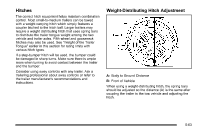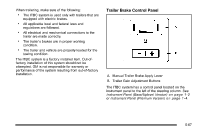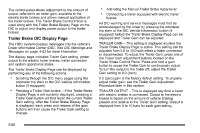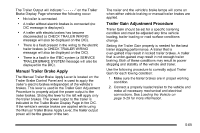2010 Chevrolet Silverado 1500 Regular Cab Owner's Manual - Page 431
2010 Chevrolet Silverado 1500 Regular Cab Manual
Page 431 highlights
This indicator light on the instrument panel cluster comes on when the tow/ haul mode is on. vehicle is unloaded. Such a selection when unloaded may result in unpleasant engine and transmission driving characteristics and reduced fuel economy. Tow/ Haul is recommended only when pulling a heavy trailer or a large or heavy load. Trailer Brakes Tow/Haul is a feature that assists when pulling a heavy trailer or a large or heavy load. See Tow/Haul Mode on page 3‑34 for more information. Tow/Haul is designed to be most effective when the vehicle and trailer combined weight is at least 75 percent of the vehicle's Gross Combined Weight Rating (GCWR). See "Weight of the Trailer" later in the section. Tow/Haul is most useful under the following driving conditions: . A loaded trailer that weighs more than 2,000 lbs (900 kg) needs to have its own brake system that is adequate for the weight of the trailer. Be sure to read and follow the instructions for the trailer brakes so they are installed, adjusted and maintained properly. If the vehicle is equipped with StabiliTrak®, the trailer cannot tap into the vehicle's hydraulic brake system. The trailer brake system can tap into the vehicle's hydraulic brake system only if: . When pulling a heavy trailer or a large or heavy load through rolling terrain. When pulling a heavy trailer or a large or heavy load in stop and go traffic. When pulling a heavy trailer or a large or heavy load in busy parking lots where improved low speed control of the vehicle is desired. The trailer parts can withstand 3,000 psi (20 650 kPa) of pressure. The trailer's brake system will use less than 0.02 cubic inch (0.3 cc) of fluid from the vehicle's master cylinder. Otherwise, both braking systems will not work well or at all. . . . Operating the vehicle in Tow/Haul when lightly loaded or with no trailer at all will not cause damage. However, there is no benefit to the selection of Tow/Haul when the If everything checks out this far, make the brake tap at the port on the master cylinder that sends the fluid to the rear brakes. Use only steel brake tubing to make the tap. 5-65
















